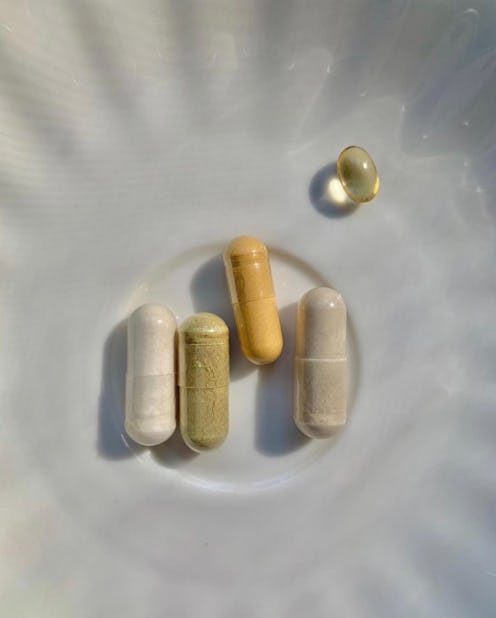(Health)
Your Go-To Multivitamin Might Not Be Doing Your Body Good, Say Experts
What’s actually in it?

The wellness world is possibly more overwhelming and confusing to navigate than ever before. With a buzzy new ingredient or trend popping up seemingly every minute, it can be challenging to know which healthy path to take. Should you sip a turmeric latte at night to help you sleep better or is CBD the way to go? What about Ashwagandha for its mood elevating benefits — is that the key to keeping yourself calm and balanced? The topic of supplements can make waters even murkier. With so many out there to choose from the great debate of individual vitamins vs. multivitamins comes to mind.
And while multivitamins are not new (remember the Flinstone variety?), one might still wonder what’s actually in them and if the body actually needs all those nutrients. You may know the use for a few of the ones in your bathroom cabinet right now — iron for bone health, B12 for energy, vitamin E for better skin. But what about the rest of it? Do you really need it all?
"According to the Council for Responsible Nutrition (CRN), 53% of U.S. adults take a multivitamin, which means more than half of Americans may be missing important nutrients that can help with their individual health concerns." says Angie Kuhn, MS, RDN, and Director of Nutrition and Research for Persona Nutrition. "What’s more, a multivitamin will not address specific nutrient deficiencies resulting from dietary preferences, lifestyle factors, or prescription medication use."
So, is it better to take a multivitamin or individual vitamins? Midwife and herbalist Dr. Aviva Romm MD says that an important advantage of going "a la carte" with your supplements — as approved by your physician, of course — is a lessened chance of getting too much of something you body doesn't need. Or worse, that's actually toxic for you. She explains that while an excess of many water soluble vitamins (like C or B complex) is simply eliminated through your urine, fat solubles (E, D, and K) may be more harmful when taken beyond what your body needs.
Unlike water soluble vitamins, fat soluble vitamins are stored by the body. Therefore, when taken in excess over time, they can build up, leading to health problems. One example of this can be seen with vitamin A. "Excessive vitamin A intake can lead to a condition called hypervitaminosis A that may include symptoms such as dizziness, nausea, coma, and even [be fatal]," explains Amy Gorin, a NYC-based dietary nutritionist.
The concept of taking certain vitamins in excess should also be taken into consideration when debating over multivitamin or individual vitamins, as Romm suggests that you might be taking supplements that include more than you think. "These excess doses are a problem when you’re combining supplements because many products on the market duplicate nutrients across the board," she says. "So if you’re taking, for example, three different products, say one for sleep, one for hormone balance, and a multi, you can easily reach or exceed that max daily dose and cause toxicity."
If you are going a la carte, the experts also have a few suggestions for vitamins that tend to be beneficial to most women (in approved doses). "Vitamin D supports immunity, blood sugar balance, thyroid function, bone health, and hormone balance, to name a few important actions," says Romm. And Gorin adds that folate is important whether a woman plans to get pregnant or not. Beyond that B12, magnesium, and omega-3 fats all offer a wealth of health benefits.
Getting some vitamins individually also doesn't have to mean tossing your regular multi. "Typically a combination of these approaches is what most of us need," says Romm. "The daily multi to get what we’re most likely not getting from foods even when we’re eating well, and the a la carte for those nutrients you are low in or need to bump up for one reason or another." That said, for your most customized approach either way, it's best to check with your doctor and adjust accordingly.
This article was originally published on